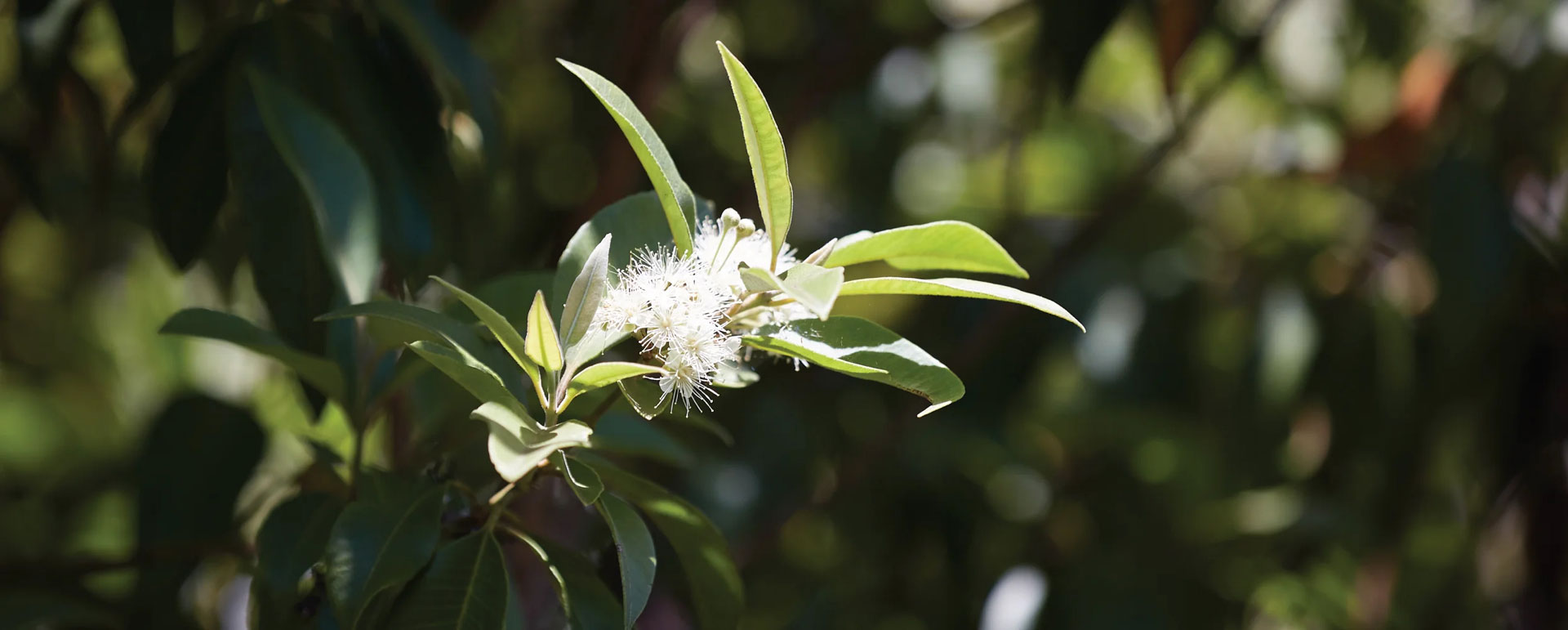
Australian Lemon Myrtle - The Best Lemon Substitute You Never Knew You Needed
Lemons are a go-to ingredient in many dishes, but what if we told you that there's a better substitute for it? That's right - Lemon Myrtle. It's a native Australian plant with a lemony aroma and flavor that can replace lemons in a variety of dishes, from savory to sweet. In this blog post, we'll explore why Lemon Myrtle is a game-changer in the culinary world and why lemon myrtle deserves a spot in your pantry.
Introducing the wonders of lemon myrtle.
Are you a fan of the bright, tangy flavor of lemons but struggle to keep them stocked in your kitchen? Look no further than the wonders of the lemon myrtle tree. Not only does lemon myrtle make a fantastic substitute for lemon juice and lemon zest, but it also boasts a host of health benefits. This Australian native plant is packed with vitamin C, antioxidants, and antimicrobial properties, making it a powerhouse ingredient for supporting your immune system and improving digestion. And let's not forget its citrus alternative capabilities - lemon myrtle adds a unique, zesty touch to everything from marinades to desserts. Don't miss out on this versatile and nutritious ingredient. It’s well worth giving lemon myrtle a try!
Uses of Lemon Myrtle - An Alternative Ingredient for Chefs and Home Cooks

Lemon myrtle is incredibly versatile, with lemon myrtle dried leaves or fresh lemon myrtle being able to be used in a variety of dishes. Its versatility lies in its ability to replicate the flavor of lemons without overpowering other flavors. It can also be used in sweet or savory dishes as it has a unique lemon flavor that adds an interesting depth and complexity to any meal. For example, it's perfect for enhancing fish dishes with its citrusy notes, or elevating desserts by adding a touch of sweetness and aroma. In addition to this, Lemon Myrtle also works just as well when added to drinks such as cocktails.
Lemon Myrtle Uses in the Kitchen - Unlock Its True Potential
Lemon myrtle and lemon myrtle oil have endless uses in the kitchen; from sweet to savoury. For example, it can be used in sauces, marinades, stews, curries and even desserts. Its unique citrusy flavor makes it a great addition to any dish and can help elevate the flavors of the meal.
Additionally, you can also use Lemon Myrtle as a garnish or a seasoning for almost any dish; from salads to stir-fries . It also makes an excellent tea , which is perfect for cold winter days.
How to use Lemon Myrtle in cooking.
Lemon myrtle is a versatile herb that can be a game changer in your cooking. With its fresh and zesty aroma, this herb is perfect for enhancing the flavor of your culinary creations. Whether you're baking a cake, grilling a fish, or mixing up a salad dressing, lemon myrtle adds a unique twist to any dish. A little bit goes a long way, so start with a small amount and gradually increase until you find the perfect balance. Trust us, once you experience the magic of lemon myrtle, you'll wonder how you ever cooked without it. So why not try something new and add some extra zest to your meals?
Why Lemon Myrtle is becoming popular in professional kitchens worldwide

As professional chefs around the globe seek fresh and innovative flavors, lemon myrtle has emerged as the secret ingredient in many of their culinary creations. This unique Australian herb offers a zesty, lemony flavor that perfectly complements a range of dishes, from seafood and poultry to desserts and cocktails. With its versatility and exotic taste, it's no wonder that lemon myrtle, including lemon myrtle oil, has taken the culinary world by storm. From high-end restaurants to food trucks, chefs everywhere are incorporating this flavorful herb into their signature dishes, making lemon myrtle one of the most sought-after ingredients in professional kitchens worldwide.
Making The Switch to Lemon Myrtle - Easy Tips For Substituting it in Your Favorite Dishes
Are you tired of using the same old spices in your cooking? Why not try making the switch to Lemon Myrtle? This versatile spice can add a unique and refreshing flavor to a variety of dishes, from chicken to fish to desserts. Don't let the thought of substituting one spice for another intimidate you. It's easy! You'll be pleasantly surprised at how it elevates your dish. Not only will it give your taste buds a new experience, but Lemon Myrtle also has potential health benefits, such as aiding in digestion and boosting the immune system.
Making the switch to lemon myrtle is easy with a few simple tips. First, start small and experiment with a sprinkle here and there. You can also experiment with lemon myrtle oil. You'll soon find it's a great alternative to lemon zest. Second, remember to reduce the amount you use as it has a stronger flavor than lemon juice. Lastly, get creative and try experimenting with it in your favorite dishes! By substituting lemon myrtle in your cooking, you'll not only be introducing a new flavor but also supporting a sustainable industry.
Recipe suggestions for lemon myrtle and lemon myrtle oil

If you're looking to add some bold and unique flavors to your cooking, look no further than lemon myrtle! This versatile Australian bush herb and essential oil, has a wonderfully tangy and fragrant flavor that lends itself perfectly to a variety of dishes. Try using it as a seasoning for seafood, seasoning poultry or sprinkling it on roasted vegetables. You can even mix it with olive oil or butter for a zesty spread or marinade. The possibilities are endless!
Here are a few lemon myrtle recipes suggestions that feature lemon myrtle as a star ingredient:
- Lemon Myrtle and Garlic Roasted Salmon
- Lemon Myrtle & Thyme Grilled Chicken
- Baked Fish with Lemon Myrtle Butter
- Spinach Salad with Lemon Myrtle Dressing
- Zucchini Fritters with Lemon Myrtle Aioli
- Chocolate Cake with a Citrusy Twist (Lemon Myrtle Frosting)
- Coconut Macaroons with Lemon Myrtle Glaze.
- Lemon Myrtle cheesecake
- Lemon Myrtle Dukka
- Lemon Myrtle essential oil iced tea
Understanding How Lemon Myrtle Enhances Other Ingredients in Recipes
Not only does lemon myrtle add a citrusy twist to traditional dishes, but it can also enhance the flavors of other ingredients. The bright and refreshing aroma of lemon myrtle can elevate the taste of chicken, fish, and vegetable dishes, making them burst with zesty goodness. Additionally, lemon myrtle's ability to balance sweet and savory notes makes it a fantastic ingredient in desserts as well. Whether you are an accomplished chef or just starting to experiment in the kitchen, lemon myrtle is a must-have ingredient that can add depth and complexity to any dish.
5 simple ways to Incorporate Lemon Myrtle and lemon myrtle oil into Your Meals
If you're a fan of bold, zesty flavors then you simply have to try incorporating lemon myrtle, as either dried leaf, powder or essential oil, into your day to day cooking routine. Known for its intense citrus aroma and incredible versatility, this unique ingredient can add a refreshing twist to a range of savory and sweet dishes alike. Whether you're a seasoned chef or a beginner in the kitchen, there are plenty of simple ways to start enjoying the benefits of lemon myrtle. For example, consider using it as a seasoning for roasted vegetables or chicken, adding a pinch to your morning smoothie or tea, or even using it to flavor baked goods like cakes or muffins. And don't forget that you can also drink lemon myrtle tea, using the lemon scented dried leaves. With just a little experimentation and an open mind, you'll soon discover why so many foodies around the world are singing the praises of this incredible herb.
Lemon Myrtle Properties and Benefits - The Ultimate Australian Superfood

Lemon myrtle has the potential of being incredibly beneficial and incredibly effective. This is because it has some extremely powerful properties. Lemon Myrtle contains an incredible amount of antioxidants, with a far higher concentration than lemons. This means that it can help protect the body from free radical damage, inflammation and other illnesses. Finally, due to its high citral content (the substance responsible for its characteristic lemon scent), Lemon Myrtle is also a natural preservative , meaning it can help to extend the shelf life of food.
The Perfect Substitute for Lemons
Lemon myrtle is quickly becoming a popular alternative to lemons in kitchens around the world. Not only is lemon myrtle a great flavour, Lemon Myrtle is also rich in antioxidants and vitamins A, B2, C, and E. This makes it an excellent source of nutrients and helps boost immunity. Another great fact about Lemon Myrtle is how it can aid in digestion due to its high fiber content which helps maintain regularity.
Lemon myrtle has a unique citrus flavor - tart yet sweet with subtle hints of nutmeg and mint all at once. It is also an excellent flavor enhancer for a wide variety of dishes, from sweet desserts to savory sauces or marinades.
How To Use Lemon Myrtle in Your Cooking
Lemon Myrtle can be used in a variety of ways to add flavor and nutrition to your meals. Here are some tips on how to use it:
- Add a teaspoon of dried lemon myrtle leaves to salads and soup recipes as a flavoring agent.
- Create a simple syrup by boiling 3 cups of water with 1 cup of sugar and adding 2 tablespoons of dried lemon myrtle leaves. Refrigerate until cool before using in cocktails, teas, or desserts for extra zing!
- Make a paste of lemon myrtle leaves and olive oil and rub it onto chicken or fish before baking or grilling for an extra kick.
- Use it to make a unique tea blend - add 3 tablespoons of dried lemon myrtle leaves to 4 cups of boiling water, let steep for 15 minutes then strain. Perfect for cold winter days!
- Add lemon myrtle to your favorite sweet recipes such as cakes, biscuits, muffins and other baked goods. The subtle flavor will add complexity and depth that is sure to please!
Lemon Myrtle vs. Lemon
Lemon Myrtle has a stronger and more intense citrus flavor than lemons, making it more versatile in cooking. It’s also more acidic, allowing for better preservation and lower levels of bacteria growth, which can help prolong the shelf life of food. Lemon Myrtle is also non-acidic, meaning it won’t curdle milk-based ingredients, making it perfect for dishes such as cream sauces and custards. Finally, Lemon Myrtle is easier on the stomach than lemons, so it’s a great option for people who are sensitive to the citric acid found in lemons.
Lemon myrtle essential oil in cooking

So we've spoken a lot about dried lemon myrtle leaves, and we have not even touched the surface as to using lemon myrtle essential oil in cooking. Essential oils are incredibly concentrated forms of natural ingredients, meaning they can be used to add intense flavor without the need for a large amount. Due to its strong aroma, lemon myrtle is an ideal candidate for essential oil cooking. A few drops of this versatile oil can be added to sauces or dressings for a zesty kick, or even incorporated into cakes and cookies for a vibrant citrus flavor.
How does lemon myrtle compare to sweet verbena myrtle?
Lemon Myrtle differs from sweet verbena in the fact that it has a stronger and more intense citrus flavor. Sweet verbena myrtle is a bit more subtle, with a slightly sweet edge to its flavor. Both herbs are great for adding depth and complexity to dishes, however lemon myrtle will be best for recipes that require an extra kick of zesty flavor.
Overall, both herbs are wonderful additions to any kitchen and offer different flavor profiles to suit all types of dishes. Experiment with both herbs and find out which one suits your taste buds the most!
What gives the citrus kick to lemon myrtle?
Lemon myrtle leaves are renowned for their abundant content of plant citral, with a concentration exceeding 90%. Citral, a remarkable compound, possesses powerful properties that effectively hinder the growth of bacteria and fungus. When compared to lemons, lemongrass, and limes, lemon myrtle stands out with its incredibly high levels of citral. In fact, it has been found to contain up to 98% of this aromatic compound, which gives it its signature lemony scent and flavor. Its concentration of citral is significantly higher than lemons and limes, making it a perfect substitute for these fruits in your recipes.
Health Benefits of Lemon Myrtle
Studies show that Lemon Myrtle has high levels of antioxidants, anti-inflammatory, and anti-microbial properties. These attributes can help boost the immune system, fight off harmful bacteria, and reduce inflammation in the body.
Versatility
Lemon Myrtle can be used in a wide range of culinary applications. It can be added to marinades, dressings, and sauces to give them a tangy kick. It's also an excellent choice for baking, particularly in recipes where lemon zest is required. Lemon Myrtle can be added to tea, smoothies, and cocktails to add a unique and fresh flavor. Chefs are always coming up with new ways to use this versatile ingredient, and it’s no surprise why.
Sustainability

Lemon myrtle is is farmed in a way that utilises sustainable farming practices. In fact every part of the leaf and stem is used to make a variety of products ranging from dried leaves, essential oils, hyrdolols and micropowders. These products can be used in a variety of ways to help promote healthy living.
Conclusion
Lemon Myrtle is quickly becoming one of the most popular substitutes for lemons, limes, and lemongrass. It has a unique flavor and aroma that adds complexity to dishes while also boasting powerful health benefits. Whether you're looking to enhance your savory or sweet recipes, this wonder ingredient is sure to make every dish more interesting! Just remember to use it sparingly as its citrusy notes can overpower other flavors.
We believe that lemon myrtle is a fantastic ingredient that should be in every chef's pantry. Its unique citrus flavor, health benefits, and versatility make it a game-changer in the culinary world. Using Lemon Myrtle can elevate any dish with a tangy kick and provides a sustainable substitute for lemons. Try it out on your next dish or beverage, and experience the magic of Lemon Myrtle.
Stay in the know by clicking here.


